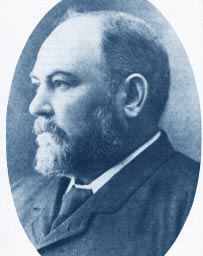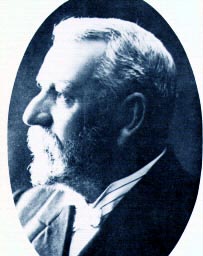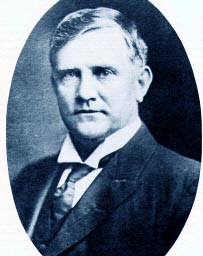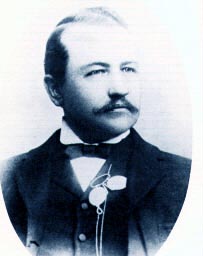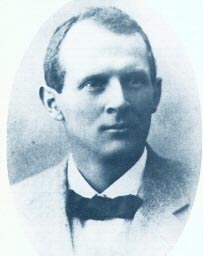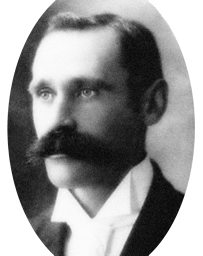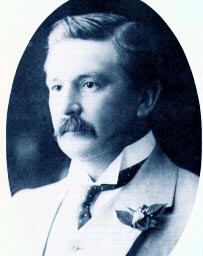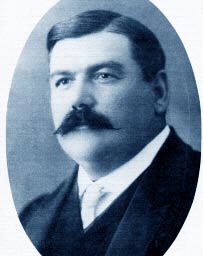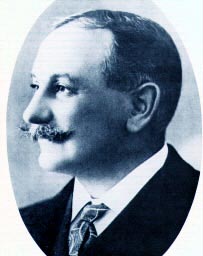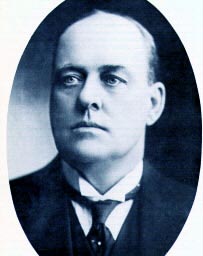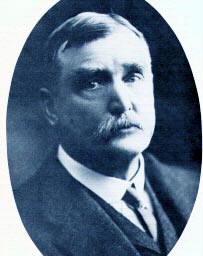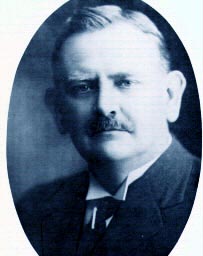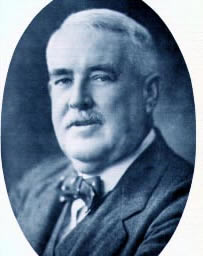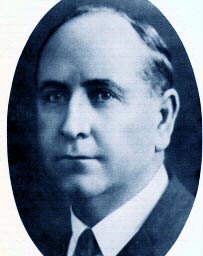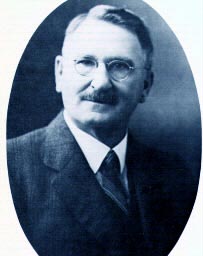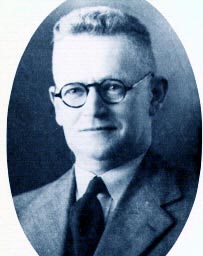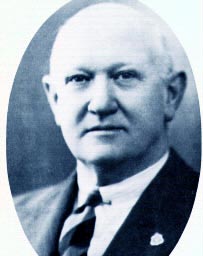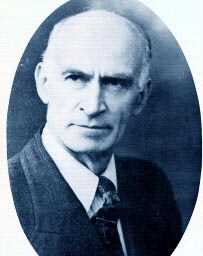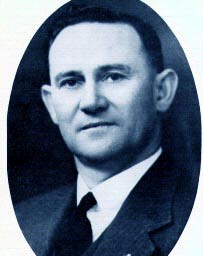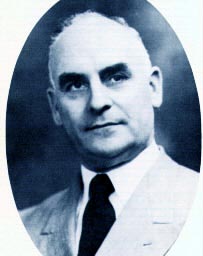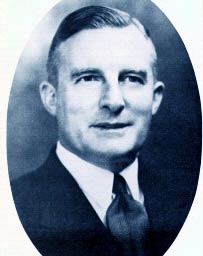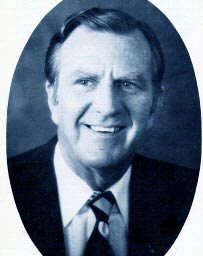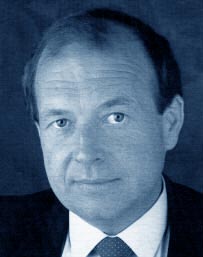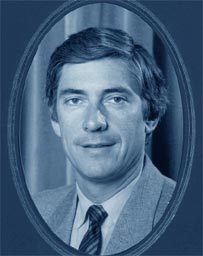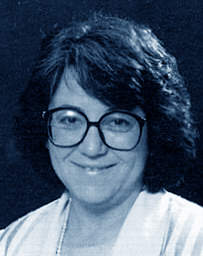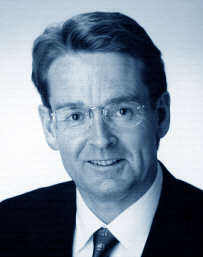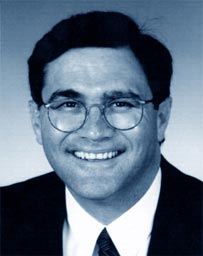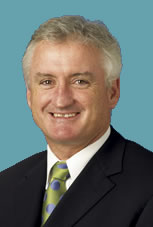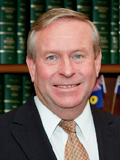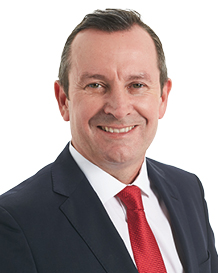Journey through time to meet our Premiers, starting with our first Sir John Forrest to our current Premier Mark McGowan.
Sir John Forrest (Forrest Party)
Show moreFirst Barron Forrest of Bunbury (1847-1918) was a surveyor, explorer, Western Australia's first Premier and later a minister, acting Prime Minister and first Treasurer in the newly formed Federal Government after Federation.
Sir John Forrest was the third son of 10 children. He was a large man, reputedly weighing 127 kilograms, and famous for the girth of his waist which was reported to be 54inches - or 137 centimetres. Forrest was knighted by Queen Victoria in 1882 for his valuable services in exploring the interior of the State. In 1883, he was appointed Surveyor-General, the first West Australian to be appointed to an Executive Council office.
He was State Premier and Treasurer from 29 December 1890 to 14 February 1901. Forrest spent 17 years in politics, nine of them in the federal arena. He was one of the founding fathers of Federation and was actively involved in the drafting of the Commonwealth Constitution late last century, seeking to ensure WA did not lose too much power to the Federal Government. WA was the last State to join the Federation after Sir John called a referendum on the issue on 31 July 1900.
As a politician he was not a good speaker but he loved public life and its associated pomp and ceremony. He was a strong supporter for strengthening the bonds that tied the dominions to Great Britain. After a long illness, Forrest resigned as federal Treasurer on 27 March 1918. He set sail for London in June that year to take up his seat in the House of Lords.
However, on 2 September, he died while the ship was anchored off Sierre Leone. He was buried there but his remains were subsequently brought back to WA and placed at Karrakatta cemetery on 7 May 1919.
George Throssell (Forrest Party)
Show moreGeorge Throssell was born in Ireland and came to Australia with his father at the age of 10.
George Throssell attended the Public School in Perth. He began his own business in Northam and later was elected to the Northam Municipal Council. For the next 14 years he held the positions of chairman of the council and mayor.
He was popularly known as "the lion of Northam" or "father of Northam". He entered Parliament in 1890, elected unopposed to the Legislative Assembly for the seat of Northam.
Mr Throssell took over from Sir John Forrest as Premier when he resigned to join the Federal Parliament. However, he lacked Sir John's political control and only served in the position for three months.
He was a popular and forceful friend of the farmer. He won agreement to take the Yilgarn railway line via Northam instead of York and was responsible for the first Land Purchase Bill and the first Land Drainage Bill.
He owned several properties throughout the State and supported closer settlement. He supported Sir John in the passing of the Homestead Act whereby "bona fide" settlers were given 160 acres of free land. He also supported the Agriculture Bank.
His son, Captain Hugo Throssell, won the Victoria Cross at Gallipoli in 1915.
George Leake (Opposition Party)
Show moreGeorge Leake - who was named after his father George - was born in Perth in 1856.
George Leake followed in his father's footsteps by becoming a lawyer and then joining his father's legal firm in 1880. Three years later he was appointed Crown Solicitor and Public Prosecutor.
He was elected to the first Parliament as MLA for Roebourne in 1890 but was not included in Forrest's first ministry. He resigned 2 days after being elected - and before he was sworn in as an MLA - so that he would not lose his position as Crown Solicitor. Four years later he won the seat of Albany. He resigned again in 1900 for "business reasons".
Mr Leake was a strong supporter of Federation, was President of the Federation League and urged West Australians to join.
He entered the fourth Parliament when he won the seat of West Perth in April 1901. He was appointed Premier and Attorney General on May 17, 1901, but resigned his office six months later after a no confidence motion was carried in the Legislative Assembly. He was re-appointed Premier a month later and held office until his unexpected death in June 1902.
Mr Leake's great passion was the gold mining industry. He was a member of the syndicate that sent Anstey's successful expedition to find gold in the Yilgarn Valley in 1887. In 1896, he visited England and while he was there he finalised negotiations for a tramway system for Perth.
Alfred Deakin, who was the Prime Minister at the time of Mr Leake's death, praised the Premier in a telegram, saying his "great sacrifices and loyal services in the cause of Federation and his unflagging devotion to the interests of Western Australia placed all Australians under a lasting debt of gratitude to him".
Alfred Edward Morgans (Ministerialist)
Show moreAlfred Morgans was an interesting character who lived for 18 years in Mexico, spoke fluent Spanish and was fascinated by Mexico's natural history and Aztec handicrafts.
Alfred Morgans was born in Wales and educated at private schools and the Welsh School of Mines. He became an apprentice to a mechanical engineering firm and was sent to Mexico in the late 1870s to supervise its gold and silver mines.
His love of Mexico's social and natural history led him to archaeological research and he unearthed many Aztec pieces, some of which were donated to the British Museum. He came to WA in 1896 as a representative of Morgans' Syndicate Ltd. He developed many property and mining investments throughout the State. His reputation in the industry grew and he earned the title of "the doyen of mining magnates".
He was elected to the Third Parliament as MLA for Coolgardie in 1897 and took over from George Leake as Premier in November 1901. His Government though was short-lived after it was defeated in the Assembly just a month later when three of his new Ministers failed to get re-elected, and he was refused a dissolution of the Assembly by the Governor.
He decided not to renominate at the next election mainly due to his aversion to politics. He was described as a kind and considerate man who had great personal charm. He said that during his life in politics he made more enemies than the whole of the rest of his existence.
One of the things he wanted to achieve, but had no success, was a railway line between the Goldfields and the port at Esperance.
Life after politics involved a variety of consular-diplomatic appointments in WA.
Sir Walter Hartwell James (Liberal)
Show moreSir Walter James came to politics via a stint as a jackaroo and then lawyer. He was born in Perth in 1863.
At 14 years of age Sir Walter James' father died. As a young man he went to work at De Grey station in the Pilbara as a jackaroo but after being shipwrecked off Rottnest in 1883 on his way back to the North-West, he decided to abandon his pastoralist pursuits and turn to law. He was articled to George Leake MLA, furthered his studies in England, and was admitted to the Western Australian Bar in 1888.
He represented the City Ward on Perth City Council for seven years from 1891 and was elected MLA for the working class seat of East Perth in 1894.
Sir Walter became an active member of the Western Australian Liberal Association, a reformist organisation that pursued liberal ideals. Interestingly, Sir Walter was a strong supporter of the federalist movement and, along with George Leake and Sir John Forrest, was a member of the WA delegation to the Federal Convention 1897 and 1898. He campaigned ardently for WA to join the Federation and was also the chief advocate in Parliament for the women's suffrage movement.
He took over as Premier at 39 years of age in 1902 after Mr Leake's death. He tried to reform the franchise during his term as Premier but his legislation was defeated in the Upper House. His government was defeated in 1904 and he resigned to accept the job as Agent General for WA in London.
When he returned to WA he devoted himself to his legal practice and rose to prominence as a leading member of the Bar.
In 1909, he was appointed to a Royal Commission to look into the setting up of a university in Perth. When the University of Western Australia was established he became a foundation member of its Senate and was later elected chancellor in 1930. Two years later he turned down an offer from Premier Sir James Mitchell to become Lieutenant-Governor of WA.
He was awarded an honorary degree of Doctor of Laws in 1936, seven years before he died.
Henry Daglish (Labor)
Show moreVictorian-born Henry Daglish was WA's first Labor Premier.
Henry Daglish began a career in the mechanical engineering field but after a year had a change of heart and joined the Victorian Public Service. His first foray into politics in 1896 was an absolute failure when he stood for a Victorian seat and gained only 34 votes out of 2192.
Shortly after he wrote to Premier Sir John Forrest, asking for work in the WA Public Service and was made assistant to the chief clerk in the Police Department. Later he resigned to go into business as an accountant, legal manager and auctioneer. He stood for and won the seat of Subiaco in 1901 as a Labor MLA. Mr Daglish also was elected mayor of Subiaco in 1902 - a position he held twice for a total of three years.
In 1904, Mr Daglish was re-elected to Subiaco with 79 per cent of the vote. Just two months later he had successfully moved a motion that was carried to defeat Sir Walter James' government in the Assembly.
He then formed the State's first Labor government, taking on the position of Premier, Treasurer and Minister for Education. But his success was to be short-lived; his government resigned after just 12 months over its failure to buy the Midland Railway Company.
Mr Daglish quit the leadership of the Labor Party and called himself Independent Labor. In 1910, he accepted the appointment as Minister for Works in Frank Wilson's Liberal government.
In October 1911, he lost his seat at the general election and the following year he joined the Court of Arbitration as an employer's representative.
He held the position until his death in 1920.
Sir Cornwaithe Hector Rason (Liberal)
Show moreSir Cornwaithe Rason was born in England, the son of a Royal Naval surgeon.
Sir Cornwaithe Rason came to Australia in 1881 in search of his fortune but returned home 18 months later, none the richer. After marrying in 1883, he returned to WA with his wife and her brother and set up as a general merchant and storekeeper.
The company tried to cash in on the Kimberley gold rush and mining activity in the eastern Goldfields.
Sir Cornwaithe's political career began when he was elected to the Legislative Council for the Swan District in 1889. He was keen on the concept of responsible government. He held the seats of South Murchison and Guildford during the next 11 years.
In 1901, he became Minister for Works and was responsible for the Coolgardie Water Scheme, in 1904 Colonial Treasurer and in 1905 he was appointed Premier, Colonial Treasurer and Minister for Justice.
The following year he resigned from Parliament to take up the post of Agent General in London, a position he held for six years. He stayed in Britain and joined Bovril Australian Estates Ltd as chairman, a position he held until his death in 1927.
Major-General Sir Newton James Moore (Ministerialist)
Show moreSir Newton James Moore was born in Fremantle on 17 May 1870.
When he left school, Sir Newton James Moore was apprenticed as a sales assistant in Geraldton then went on to complete his apprenticeship as a land agent and surveyor. He set himself up as a contract surveyor, specialising in the Wellington district covering the south west towns of Collie, Pinjarra, Bunbury and Busselton.
It was during his involvement in the region, particularly when he became the Mayor of Bunbury, that Sir Newton aspired to a life in politics. But it was to take two attempts to win a seat. He unsuccessfully contested the Legislative Assembly seat of Bunbury on 1901 but finally won it in 1904. He held the seat until 1911.
Sir Newton became Minister for Lands and Agriculture in the Rason Government in 1905. A year later, Sir Cornwaithe Rason resigned and Sir Newton stepped into the Premier's position, dropping agriculture but retaining lands.
Sir Newton championed a policy of cheap land for settlers as well as pushing for agricultural development, encouraging the forestry and wheat industries. In 1909 he became Colonial Treasurer. But just 15 months later, he resigned as Premier because of ill health. He had been given his knighthood three months earlier.
In February the following year, he was appointed Agent General in London - a position he held until 1917 and during which he strengthened the role of the Immigration Department and the flow of immigrants to WA.
Sir Newton was always fascinated by the militia and held a commission for more than 16 years, including commanding the 18th Regiment Australian Light Horse. During his term as Agent General he was appointed General Officer Commanding Australian Imperial Forces in the United Kingdom.
But a parliamentary career beckoned once more - this time in Britain where he was elected to the House of Commons in 1918. He resigned 14 years later to become president of the British Empire Steel Corporation.
Frank Wilson (Liberal)
Show moreFrank Wilson was born in England. He spent some time going to school in Germany and was later indentured to a firm of shipbrokers and timber merchants.
In 1887, Frank Wilson sailed to Queensland to take up a job as manager of a company that was a railway contractor, flour miller and machinery merchant. Four years later he relocated to Perth to manage a timber company in Canning. He was elected to the Legislative Assembly in 1897 as "a direct opponent of the Forrest Government". Two years later his seat was abolished forcing him to contest the seat of Perth which he won in 1901. However, he was defeated at a poll that same year after his appointment as Minister for Mines in the Morgans government.
In 1904, he stood again for Parliament and was successful, holding the seat of Sussex until 1917.
Mr Wilson was appointed Minister for Works in the Rason government in 1905, then Treasurer, Minister for Education and Minister for Agriculture in the Moore Government in 1906. He became Minister for Works in 1909. A year later, he was appointed Premier and Colonial Treasurer after the resignation of Sir Newton Moore, only to be defeated at the polls the following year.
Under Mr Wilson, the government of the day introduced legislation that saw the establishment of the University of Western Australia. In June 1911, with Parliament's approval Mr Wilson and his wife represented the State at the coronation of King George V and Queen Mary.
He held the job as Opposition leader until 1916, when he was again appointed Premier and Treasurer on the defeat of Premier John Scaddan. But 11 months later he resigned office and sat as an independent after H.B. Lefroy was asked to lead the National Party (coalition) Government. Three months later there was a general election and he lost the seat of Sussex - but only by a margin of four votes.
The following year, aged 59, he died at Claremont and was buried at Karrakatta Cemetery.
John Scaddan (Labor)
Show moreJohn Scaddan went from being a Labor Premier to a Nationalist MLA during his parliamentary career.
John Scaddan was born in South Australia and educated in Victoria. As a young man he worked as a miner in the Victorian Bendigo district. In 1896, he moved to WA - perhaps on the strength of the gold discoveries at Kalgoorlie. Mr Scadden's entry was through his union membership - he became an Engine Drivers' Union member after qualifying as an engine driver while in Kalgoorlie.
He was elected Labor MLA for Ivanhoe in the Goldfields in 1904 and became leader of the party in 1910 when T.H. Bath retired. The following year saw Labor returned to power with an overwhelming majority and Mr Scaddan, at just 35, formed his ministry. His government focused heavily on a policy of setting up State enterprises, including hotels, a State shipping service, brickworks, sawmills and buying up the Perth tramways. It also pushed to build homes for workers.
However, in 1916, Mr Scaddan's government was defeated in the Lower House and was forced to resign when the Governor Sir Harry Barron refused a dissolution of Parliament. Mr Scaddan, now Opposition leader, ultimately fell out with the Labor Party over conscription and left the party. The following year he accepted the position as Minister for Mines and Railways in the Sir Henry Lefroy Nationalist Ministry, but a month later lost his seat at the polls and resigned his protfolio.
Two years later he was appointed Colonial Secretary and Minister for Railways in Sir James Mitchell's government though he was not a member of Parliament at the time. Two weeks later he was successful in being elected to the seat of Albany. At the 1924 election he did not stand again for the seat and saw the defeat of the Mitchell government. It was six years on that he decided to re-enter Parliament as a Nationalist MLA for Maylands and he became Minister for Mines, Railways, Police, Forests and Industry in the new Mitchell government which was defeated three years later.
He was a member of the Perth Roads Board and its chairman from 1931 until his death in 1934.
The following year, aged 59, he died at Claremont and was buried at Karrakatta Cemetery.
Frank Wilson (Liberal)
Show moreFrank Wilson was born in England. He spent some time going to school in Germany and was later indentured to a firm of shipbrokers and timber merchants.
In 1887, Frank Wilson sailed to Queensland to take up a job as manager of a company that was a railway contractor, flour miller and machinery merchant. Four years later he relocated to Perth to manage a timber company in Canning. He was elected to the Legislative Assembly in 1897 as "a direct opponent of the Forrest Government". Two years later his seat was abolished forcing him to contest the seat of Perth which he won in 1901. However, he was defeated at a poll that same year after his appointment as Minister for Mines in the Morgans government.
In 1904, he stood again for Parliament and was successful, holding the seat of Sussex until 1917.
Mr Wilson was appointed Minister for Works in the Rason government in 1905, then Treasurer, Minister for Education and Minister for Agriculture in the Moore Government in 1906. He became Minister for Works in 1909. A year later, he was appointed Premier and Colonial Treasurer after the resignation of Sir Newton Moore, only to be defeated at the polls the following year.
Under Mr Wilson, the government of the day introduced legislation that saw the establishment of the University of Western Australia. In June 1911, with Parliament's approval Mr Wilson and his wife represented the State at the coronation of King George V and Queen Mary.
He held the job as Opposition leader until 1916, when he was again appointed Premier and Treasurer on the defeat of Premier John Scaddan. But 11 months later he resigned office and sat as an independent after H.B. Lefroy was asked to lead the National Party (coalition) Government. Three months later there was a general election and he lost the seat of Sussex - but only by a margin of four votes.
The following year, aged 59, he died at Claremont and was buried at Karrakatta Cemetery.
Sir Henry Bruce Lefroy (Nationalist)
Show moreSir Henry Lefroy was born into a prominent settler family in the colony. His father was a well-known public official before the days of responsible government, holding the positions of Secretary to Governor Fitzgerald and Colonial Treasurer.
Sir Henry Lefroy was born in 1854 in Perth and attended Mrs McKnight's school in St Georges Terrace before going to school in England. He was a good scholar and sportsman, particularly at cricket. When he returned to WA in 1873 he went to manage his father's station on the Victoria Plains, near Moora. It was the beginning of a 30-year association with the area as a Victoria Plains Road Board member and its chairman for 21 years.
In 1892, he entered Parliament as the MLA for Moore. Interestingly there were fewer than 100 voters in the electorate.
In 1897, he was appointed Minister for Education in the Forrest Cabinet and later Minister for Mines. In 1901, he was sent to London as WA's Agent General for three years after he decided not to seek re-election that year. But five years later and back in WA he decided to stand for the seat of Moore again - and won.
He was keenly interested in his electorate's local affairs and was elected chairman of the Moora Road Board when it was first established in 1909 until 1917. He was appointed Minister for Lands and Agriculture in the second Wilson government in 1916.
In 1917, the ALP split over the issue of conscription and Sir Henry was thrust into the Premiership, leading a National Government based on a coalition of ALP defectors, led by John Scaddan. His knighthood came in the 1919 New Year's Honours list, though he was to resign as Premier a few months later because of mounting pressure that he lacked the skills of a strong leader.
His time as Premier saw the First World War end. After his resignation he remained the MLA for Moore but was defeated at the polls two years later. He died nine years later, in 1930, at the age of 76.
Sir Hal Pateshall Colebatch (Nationalist)
Show moreSir Hal Colebatch was Premier for just one month.
Sir Hal Colebatch was the first and only member of the Legislative Council to be appointed Premier. His resignation came about because he had expected a seat would be found for him in the Assembly but due to industrial unrest and hostility towards his government this did not eventuate.
He resigned and asked the Governor to send for James Mitchell. Sir Hal was from Herefordshire in England and came to Australia in 1878. He settled in South Australia with his parents. It was here that his great interest in journalism began with a six-year stint on The Silver Age. In 1895, he came to WA and worked on two Goldfields newspapers, including The Kalgoorlie Miner.
A year later he moved to Perth and soon after bought the Northam Advertiser in partnership with a former business colleague. Sir Hal had a widespread reputation for his writing and his love of reading. He first entered public life as Mayor of Northam, a position he took up in 1909, four years after he bought the local newspaper. He was elected MLC for East Province in 1912. He held ministerial posts in the Wilson and Lefroy governments before his brief appointment as Premier.
He became a minister in the Mitchell government after his resignation and was responsible for setting up a special department for the North West. He resigned his seat in 1923 to become Agent General in London. He was knighted in 1927. On his return to Australia he stood for a federal Senate seat and won. He served there from 1929 until 1933 when he was reappointed Agent General for WA.
He went to London until 1939 and then returned home - again standing for State Parliament the following year. He won the Upper House seat for Metropolitan Province. In 1948, he lost the seat to a younger candidate endorsed along with himself by the Liberal Party.
He died in 1953.
His Excellency Sir James Mitchell (Nationalist)
Show moreSir James Mitchell was born at Dardanup on Paradise Farm. His father was a well-known farmer in the Bunbury district.
Sir James Mitchell holds a unique distinction in WA political history as the only Premier who became a Governor of the State.
He started out as a junior clerk in a Bunbury bank after finishing school and ended up being appointed manager of the Bank at Northam. He resigned from the bank in 1905 on winning the Legislative Assembly seat of Northam. He held that seat for 28 years.
He was appointed a Minister early in his political career and held portfolios related to land administration in the Moore, Wilson and Colebatch governments. On 17 May 1919, he was appointed Premier and took on the important post-war portfolios of land and repatriation. He resigned his first term as Premier in 1924 after his government was defeated at the polls. When Premier Phillip Collier was defeated in 1930, Sir James was returned as Premier and Treasurer for the next three years.
At the 1933 election, Sir James' government was tossed out and he also lost his seat of Northam to former Prime Minister Bob Hawke's uncle Albert Hawke. Interestingly, on the same day as the Mitchell Government was defeated, voters accepted, by referendum, a proposal for WA to secede from the federation. The new Collier government despatched the secession petition to Westminster, where the British Parliament refused to act on it.
Just three months after his electoral defeat, Sir James was appointed Lieutenant-Governor of WA but it took 14 years - after a number of Australians had been appointed to other State governor offices - for him to be appointed to the top job.
He held the office of Governor until he retired in 1951 at 85 years of age. His life ended suddenly when he died just a month later in a Railway Department Vice-Regal coach at Glen Mervyn near Donnybrook.
Phillip Collier (Labor)
Show morePhillip Collier was born in Victoria in 1873 and came to WA at the age of 31.
Phillip Collier left school at 15 to work in the mines near Ballarat and then later a variety of mines in Victoria and New South Wales. He became interested in Labor politics and was a campaign organiser for several State and federal Labor candidates. Before he came to WA he was working as a foreman on the Greater Melbourne Sewerage Scheme but he went back into the mining game when he arrived here, taking a job with a mining company.
In 1905, he was elected vice president of the Goldfields Trades and Labor Council and MLA for Boulder. Twelve years later he took over the parliamentary leadership of the Labor Party, a position he held for the next 19 years, including nine as Premier (1924-1930 and 1933-1936).
Mr Collier was best known during the First World War as an anti-conscriptionist. He also fought successfully to have a federal land tax imposed.
Mr Collier, and Mitchell before him, dominated State politics in the 1920s and 1930s, and unusually he nominated Mitchell (his previous political rival) for the position of Lieutenant-Governor in 1933. Mr Collier also surprisingly was convinced to present WA's secession petition to Westminster in 1934, though he had been unenthusiastic about the issue in Opposition.
In 1936, due to ill health, he handed over the reins of the party's leadership to J. C. Willcock. He held on to his parliamentary seat until his death in 1948.
His Excellency Sir James Mitchell (Nationalist)
Show moreSir James Mitchell was born at Dardanup on Paradise Farm. His father was a well-known farmer in the Bunbury district.
Sir James Mitchell holds a unique distinction in WA political history as the only Premier who became a Governor of the State.
He started out as a junior clerk in a Bunbury bank after finishing school and ended up being appointed manager of the Bank at Northam. He resigned from the bank in 1905 on winning the Legislative Assembly seat of Northam. He held that seat for 28 years.
He was appointed a Minister early in his political career and held portfolios related to land administration in the Moore, Wilson and Colebatch governments. On May 17, 1919, he was appointed Premier and took on the important post-war portfolios of land and repatriation. He resigned his first term as Premier in 1924 after his government was defeated at the polls. When Premier Phillip Collier was defeated in 1930, Sir James was returned as Premier and Treasurer for the next three years.
At the 1933 election, Sir James' government was tossed out and he also lost his seat of Northam to former Prime Minister Bob Hawke's uncle Albert Hawke. Interestingly, on the same day as the Mitchell Government was defeated, voters accepted, by referendum, a proposal for WA to secede from the federation. The new Collier government despatched the secession petition to Westminster, where the British Parliament refused to act on it.
Just three months after his electoral defeat, Sir James was appointed Lieutenant-Governor of WA but it took 14 years - after a number of Australians had been appointed to other State governor offices - for him to be appointed to the top job.
He held the office of Governor until he retired in 1951 at 85 years of age. His life ended suddenly when he died just a month later in a Railway Department Vice-Regal coach at Glen Mervyn near Donnybrook.
Phillip Collier (Labor)
Show morePhillip Collier was born in Victoria in 1873 and came to WA at the age of 31.
Phillip Collier left school at 15 to work in the mines near Ballarat and then later a variety of mines in Victoria and New South Wales. He became interested in Labor politics and was a campaign organiser for several State and federal Labor candidates. Before he came to WA he was working as a foreman on the Greater Melbourne Sewerage Scheme but he went back into the mining game when he arrived here, taking a job with a mining company.
In 1905, he was elected vice president of the Goldfields Trades and Labor Council and MLA for Boulder. Twelve years later he took over the parliamentary leadership of the Labor Party, a position he held for the next 19 years, including nine as Premier (1924-1930 and 1933-1936).
Mr Collier was best known during the First World War as an anti-conscriptionist. He also fought successfully to have a federal land tax imposed.
Mr Collier, and Mitchell before him, dominated State politics in the 1920s and 1930s, and unusually he nominated Mitchell (his previous political rival) for the position of Lieutenant-Governor in 1933. Mr Collier also surprisingly was convinced to present WA's secession petition to Westminster in 1934, though he had been unenthusiastic about the issue in Opposition.
In 1936, due to ill health, he handed over the reins of the party's leadership to J. C. Willcock. He held on to his parliamentary seat until his death in 1948.
John Collings Willcock (Labor)
Show moreJohn Willcock came to WA from NSW at age 18 to work on the Fremantle Harbour and then became an engine driver with the Government Railways.
John Willcock was a committed Labor person and was president of the ALP's Geraldton District Council from 1914 to 1917.
He had a reputation for being a likeable, though quiet, man and achieved his desire to enter Parliament when he won the seat of Geraldton in 1917. He held the Police, Justice and Railways portfolios during the Collier government until its defeat in 1930. When the Labor government was returned to power in 1933, he resumed the Justice and Railways ministries.
On Mr Collier's resignation (due to ill health) as Premier in 1936, Mr Willcock was sworn in to replace him. He was Premier and Treasurer for nine years (and Minister for Forests for seven years) before resigning due to ill health in 1945.
One of his strengths was his ability to maintain sound relationships with his colleagues which was attributed to his disarming modesty.
In 1937, he represented the WA branch of the Empire Parliamentary Association at the coronation of Their Majesties King George VI and Queen Elizabeth.
After his resignation he retired to the back benches of the Legislative Assembly and did not stand fro re-election at the poll of 1947.
Premier Willcock converted from being a Methodist to a Roman Catholic late in life and when he died was given a Requiem Mass and a State funeral.
Frank Joseph Scott Wise (Labor)
Show moreFrank Wise was another West Australian Premier born in the Eastern States.
Frank Wise was born in Queensland and finished school there to become a farmer, concentrating on tropical fruits. He chose agriculture rather than university even though he matriculated. After four years farming he joined the Queensland Department of Agriculture and then six years later came to WA as an adviser to the Department of Agriculture.
In 1928, he was appointed to report on agriculture in the Northern Territory and the North West of WA, and the following year went back to the department to supervise agricultural development in the North West as a tropical adviser. He was responsible for fostering banana growing in the lower Gascoyne Valley after he convinced the department to buy 500 banana suckers from his home State.
In 1933, he successfully contested the seat of Gascoyne in an election that also saw Albert Hawke and John Tonkin (who would later also become Premiers) win seats. He was appointed Minister for Agriculture and the North-West three years later. He became Premier in 1945 after the resignation of John Willcock. He was the first Premier to be appointed from a North West electorate of the State, and to date, that still stands.
When his government was defeated in 1947, it brought to an end 14 years of Labor rule.
Frank Wise spent the next four years as Opposition leader before resigning to take up the job of Administrator for the Northern Territory which involved him taking on the position of as President of that State's Legislative Council.
Duncan Ross McLarty (Liberal)
Show moreSir Ross McLarty, as he was known, saw active service in World War 1 in France and was a major in the Volunteer Defence Corps in World War II. He was awarded the Military Medal in 1918.
Sir Ross McLarty was born in Pinjarra where his Scottish grandfather had settled and where his father also was born. His long association with the district led to his active interest in its development. He won the seat of Murray-Wellington in 1930 for both the Nationalist and Liberal parties.
He spent most of his political life in Opposition and was only appointed leader of the Liberal Party in 1946. He led the party to victory the following year and became Premier, Treasurer and Minister for Forests and the North-West and Housing.
He was defeated six years later and held the post of Opposition leader for another year.
He resigned from the Assembly in 1962 after 32 years as the member for Murray and died suddenly seven months later in Pinjarra.
Albert Redvers George Hawke (Labor)
Show moreAlbert Hawke caused one of the State's biggest political upsets of the century by winning the seat of Northam and ousting Premier Sir James Mitchell, who had held the seat for 28 years.
Albert Hawke was born in South Australia and came to WA in 1928. He had limited schooling as a boy and in fact left school to take up a job as an apprentice clockmaker and jeweller at the age of 13. At 15, he became a clerk in a lawyer's office and it was then that he also joined the ALP.
His first foray into politics was in 1924 when he won a seat in the South Australian Parliament at 23, making him the youngest member to have taken a seat in the Assembly. He lost the seat by 11 votes three years later.
The following year he moved to WA and became a country organiser for the ALP. Just five years later he was elected to WA's Parliament, winning the seat of Northam by 460 votes and causing a political sensation by dislodging Sir James.
Bert Hawke, as he was known, kept hold of the seat for the next 35 years. He held portfolios in the Collier, Willcock and Wise governments including Employment and Labour.
He took over as party leader from Frank Wise in 1951 and led the ALP back into office two years later. He became Premier Treasurer and Minister for Child Welfare and Industrial Development.
Mr Hawke's premiership was known as a dynamic period in WA industry. His government was known for its success in encouraging industrial development in WA through the use of interest free loans and free factory sites.
The ALP was defeated in 1959 and he continued as Leader of the Opposition until 1966. He retired from politics in 1968 and returned to live in South Australia.
Bert Hawke was former Prime Minister Bob Hawke's uncle.
Sir David Brand (Liberal)
Show moreSir David Brand was born at Dongara, near Geraldton, and came from an early farming family who had property at Mullewa.
Sir David Brand left school at seventh grade and remained on the family farm until he was 23 years old. However, he finally left the farm to work in Kalgoorlie as a treatment hand, filter specialist and shift boss at the Golden Horseshoe Mine. When World War II broke out he enlisted in the Army and embarked for Egypt. He saw action in North Africa, Libya, Tobruk and finally served in Greece where he was wounded.
He spent a year in hospital before returning to Australia where he was invalided out of the Army.
He took over the general store at Dongara and joined the newly-formed Liberal Party. He won the seat of Greenough in 1945 and became the first member of the newly-formed Liberal Party to be elected to an Australian Parliament.
He served in the McLarty government in ministries including Housing, Works and Water. Sir David became leader of the party in 1957 and led the party to power in 1959.
Under his Premiership - and with Sir Charles Court as his Industrial Development Minister - there was unprecedented industrial development in the State, including the development of the Kwinana industrial strip, the standard gauge railway from Kalgoorlie to Kwinana, mining in the Pilbara and progress on the Ord River scheme.
Sir David was defeated at the polls in 1971. His 11 years, 11 months and one day Premiership was a record time in office. Sir Charles Court took over as leader in 1972. Sir David resigned his seat in 1975 due to ill health after holding it for nearly 30 years.
He died when visiting Carnamah near Dongara in 1979.
John Trezise Tonkin (Labor)
Show moreJohn Tonkin was born in Boulder in 1902 and was a teacher before he entered politics.
John Tonkin was the only Labor Premier born in WA up until 1981. He was a staunch Labor supporter and set up a branch of the Australian Labor Party in Forest Grove in 1923. He was one of the youngest delegates elected to the ALP's State Executive. He had two unsuccessful attempts at entering Parliament before winning the seat of North-East Fremantle in 1933. During his time in Parliament he served as Minister for Education, Social Services, Agriculture and Works, and Water Supplies.
He became Deputy Premier in 1955 under Bert Hawke. In 1967, he was elected leader of the Opposition and became the first person from a metropolitan electorate to hold that position since Daglish's year in office in 1904-1905.
Mr Tonkin led Labor to victory at the election in 1971.
Mr Tonkin's period in office is remembered as a period of social reform - among other firsts, establishing the Aboriginal Lands Trust and the Environmental Protection Council.
His government gave WA the distinction of being the first in the nation to create an office of the ombudsman. It also reduced the minimum voting age to 18.
He was also renowned for his support of the Tronado anti-cancer machine and for opposing the use of flouride in Perth's water supply.
The Tonkin government was defeated in 1974.
Sir Charles Walter Michael Court (Liberal)
Show moreSir Charles Court was born in England and came to Australia with his parents when he was six weeks old. His father was a master plumber.
Sir Charles Court left school after passing his Intermediate Certificate and helped supplement the family income by selling newspapers. He wanted to study law but the lack of family finances meant he turned to accountancy instead, studying at night as an articled clerk.
He was also a keen and talented cornet player, wining at the age of 18, the Australian Champion of Champions Award.
Sir Charles began his own accountancy business in 1933 and then went into partnership five years later. He left the practice in 1940 to 1946 to serve in the Army where he went from a private to lieutenant-colonel, serving in the South-West Pacific during World War ll.
He joined the Liberal Party in 1946 after what he described were the "disturbing happenings" in Australia post war. He won the seat of Nedlands in 1953 and was later appointed Minister for Industrial Development, Railways and the North-West in the Brand government.
He took over from Sir David Brand as party leader in 1972 and won government in a coalition with the National Country Party in 1974. He continued the industrial development initiatives of the Brand and Tonkin governments.
He was renowned for his anti-centralist views, was a staunch defender of States' rights, and an ardent advocate for the development of the North-West shelf.
He was the MLA for Nedlands from 1953 to 1982 when he resigned as Premier. He received his knighthood in the same year. He is the father-in-law of Margaret Court, the former Wimbledon women's singles tennis champion and father to Richard Court, who also became Premier. Together father and son held the seat of Nedlands for 48 years.
Raymond James O'Connor (Liberal)
Show moreRay O'Connor was born in Perth. He attended convent and government schools in the Wheatbelt towns of Narrogin and York, and St Patrick's Boys' school in Perth.
Ray O'Connor joined the Australian Army and served in the intelligence section of the AIF where his commanding officer was Sir Charles Court. It is said that Mr O'Connor's late father, a former policeman, encouraged his son to start a political career because of his own disillusionment with H.V. Evatt's leadership of the ALP.
Before entering Parliament, Mr O'Connor won distinction as a sportsman - he was a State champion in athletics for hurdles and discus and also a good footballer for the East Perth club.
His first attempt to enter Parliament failed when he stood as an Independent Liberal candidate for the Metropolitan Province in the Legislative Council.
He joined the Liberal Party in 1957 and in the general election of 1959 he was elected MLA for North Perth, defeating a Labor man who had held the seat for 26 years.
Mr O'Connor became Premier on the resignation of Sir Charles Court. He was defeated at the polls after just more than a year in office in 1983.
In the 1990s, he hit the headlines when he was found guilty of stealing a $25,000 Bond Corporation cheque, part of the WA Inc scandal. He served six months in gaol.
Brian Thomas Burke (Labor)
Show moreBrian Burke was a journalist before entering politics. He swept Labor to victory for the first time in nine years when he became Premier.
Brian Burke was just 36 years old when he took office. He was sworn in on his birthday and became WA's third youngest Premier.
From the start Mr Burke nominated five years as his term of office, saying he would step down on 25 February 1988 - his 41st birthday. He was the State's 23rd Premier when he was sworn in and at the time hailed as a bright, politically astute man.
During his term, WA experienced a surge in the corporate world with rising stocks and share prices. The 1980s were considered boom times throughout the nation until the biggest share market crash in history in 1987 that wiped out many of the high flyers.
Mr Burke's premiership was characterised by his association with big business and putting government and business into deals together. Ultimately, the deals caused great losses for the State and became popularly known as "WA Inc".
Mr Burke resigned as Premier before the full force of the deals and losses were known. His premiership - and downfall - was linked with the likes of Alan Bond and Laurie Connell, and the disastrous Rothwells merchant bank collapse and attempted rescue by the government.
He resigned to become Australia's ambassador to Ireland but was forced to resign that job as details of the WA Inc scandal emerged.
He was later charged with offences that resulted from a Royal Commission into the period and spent seven months in gaol in 1994.
Peter McCallum Dowding (Labor)
Show morePeter Dowding was born in Melbourne and educated in the Eastern States before commencing at Hale School in West Perth in 1957.
Peter Dowding graduated in law from the University of Western Australia in 1964 and was articled with T.J Hughes and Co. He was admitted to the Bar in 1966 practising in the areas of family and criminal law.
In 1972, he was awarded a Churchill Fellowship to examine the provision of legal services through community legal services and legal aid.
In 1976, he gave a year to the Aboriginal Legal Service in Port Hedland. The following year he ran and won a major case in the Court of Disputed Returns for Labor politician Ernie Bridge in the Kimberley that challenged the ballot results for that seat. It has become an historically important case. Mr Dowding also spent his early legal career representing unions and Vietnam war objectors.
In 1979, he won the seat of North Province in the Upper House. In 1986, he was elected to the Legislative Assembly as the member for Maylands. He was appointed Minister for Mines, Fuel and Energy. During his parliamentary career he held other portfolios including Consumer Affairs, Employment and Training and Industrial Relations.
He was Premier and Treasurer from 1988 to 1990. He resigned in 1990 during the fallout from former Premier Brian Burke's WA Inc deals.
The Labor Party appointed Dr Carmen Lawrence to replace him.
Carmen Mary Lawrence (Labor)
Show moreDr Carmen Lawrence replaced Peter Dowding to become Australia's first women Premier.
Dr Carmen Lawrence's parliamentary career began in 1986 when she won the seat of Subiaco that previously had been held by the Liberal Party for 27 years.
Dr Lawrence was born in 1948, one of a family of seven children raised in the small wheatbelt town of Morawa, north of Perth.
She graduated from the University of Western Australia as a Bachelor of Psychology with First Class Honours in 1968 and gained her Doctorate of Philosophy in 1983. She tutored and lectured at UWA before entering Parliament. She was a founding member of the Women's Electoral Lobby.
Her parliamentary career included the positions of Minister for Aboriginal Affairs and Minister for Education.
Her government was defeated at the polls in 1993. Dr Lawrence then entered Federal politics by winning the seat of Fremantle where she was appointed Minister for Human Services and Health, and Minister assisting the Prime Minister for the Status of Women in 1994.
Dr Lawrence served as the member for Fremantle. She retired from Parliament in November 2007.
Richard Fairfax Court (Liberal)
Show moreRichard Court is the son of former Liberal Premier, Sir Charles Court.
Richard Court was educated at Hale School and graduated from the University of Western Australia in 1968 with a Bachelor of Commerce degree. He furthered his studies in the United States, where he undertook management training in the automotive industry.
When he returned from the US, he established and operated a number of small business before founding Court Marine Pty Ltd, a company that manufactured and sold boats and boating equipment.
The son followed his father into politics on Sir Charles' retirement, when he was elected to the seat of Nedlands in 1982. He held a variety of shadow portfolios, including Resources and Industrial Development, Mines and Aboriginal Affairs, before becoming Premier in 1993.
He led the Coalition (between the Liberal and National parties) to victory in 1993. His government, he said, "introduced measures aimed at reducing debt, reforming the public sector and supporting economic growth".
One of his great passions is boating and he has competed in a variety of yachting classes. He lists as other interests walking, rowing, reading and music.
His government lost to Labor in February 2001 when Dr Geoff Gallop became Premier. He resigned from the seat of Nedlands, which he held for 19 years and his father 29 years before that, two months later.
Dr Geoff Gallop (Labor)
Show moreDr Geoff Gallop was elected the 27th Premier of Western Australia.
Dr Geoff Gallop was born in Geraldton in 1951 and went to school there before attending the University of Western Australia, where he graduated with an economics degree in 1971. He was awarded the Rhodes Scholarship in 1972 and graduated in philosophy, politics and economics at the University of Oxford in 1974. He was awarded his doctorate by Oxford University in 1983.
From 1981 to 1986, Dr Gallop was a lecturer in social and political theory at Murdoch University. He also served as a councillor with the City of Fremantle from 1983 to 1986.
In 1986, he contested and won the seat of Victoria Park for the ALP. He became a Minister in the Lawrence Labor Government in 1990 and held a range of portfolios, including Education, Parliamentary and Electoral Reform, Fuel and Energy, and Minister assisting the Treasurer. He was elected deputy leader of the State Parliamentary Labor Party in 1994 and two years later its leader.
Dr Gallop has been a strong campaigner in the areas of health, education and crime prevention. He also advocated improved accountability and political reform along the lines recommended by the independent Commission on Government. At Labor's State Conference in 1999, Dr Gallop won support for his policy of conserving the State's old growth forests, and at the Constitutional Convention in Canberra in 1998, he played a leading role in the push for a directly-elected President.
Dr Gallop is a keen historian and lists his sporting interests as "many and varied", including cricket, volleyball, table tennis, and he is vice patron of the Swan Districts Football Club.
At the State election in February 2001, Dr Gallop led the Labor Party to victory, winning a record 14 seats. He resigned his premiership on January 16, 2006, for health reasons.
Alan Carpenter (Labor)
Show moreAlan Carpenter was born in Albany, Western Australia, on January 4 1957. He is married to Annmarie and they have four daughters. Alan was educated at Albany Senior High School (matriculated 1974).
After graduating from the University of Western Australia with an Arts degree (politics) in 1979, Alan Carpenter returned to Albany and began a career as a journalist with the Albany Advertiser newspaper.
He worked for TVW Channel 7, Perth, and also ABC TV as a State political reporter. In 1992, he became the 7.30 Report's presenter in WA and later presented the ABC's Stateline program.
In April 1996, he resigned from the ABC and gained ALP endorsement for new state seat of Willagee. He won the seat in December 1996.
Over the next four years he had the Shadow portfolios of Disability Services, Sport and Recreation, Family and Children's Services, Education and Drugs.
He became Minister for Education, Sport and Recreation, and Indigenous Affairs in February 2001. He became the Minister for Education and Training in June 2003.
Following the Gallop Government's re-election in February 2005, he became the Minister for State Development and Energy.
Carpenter was sworn in as Western Australia's 28th Premier on 25 January 2006 and was replaced on 6 September 2008 by Colin Barnett after Labor was defeated in the general election.
Colin Barnett (Liberal)
Show moreColin Barnett was elected as Western Australia's 29th Premier of Western Australia on 6 September 2008. Following the election victory, he formed a Liberal-National Government with the support of three Independent Members of Parliament.
Becoming Premier was the culmination of a long parliamentary career: Colin Barnett was first elected as the Liberal Member for Cottesloe in 1990, he was Deputy Leader of the Liberal Party in 1992, and a senior Minister in the Court Government (1993 to 2001) holding the portfolios of Resources Development, Energy, Education, Tourism and Leader of the House. He was Leader of the Opposition from 2001 to 2005. Along with the role of Premier, Mr Barnett also held the portfolio of State Development.
Personal Background
Colin James Barnett was born in Nedlands on 15 July 1950. He was educated at Nedlands Primary School and Hollywood Senior High School. Despite initially showing an interest in geology, Mr Barnett swapped to economics, a subject that suited him well and earned him Honours and Masters Degrees from the University of Western Australia.
He began his working career in Canberra after winning a cadetship with the Australian Bureau of Statistics and later returned to WA as a lecturer in economics at Curtin University. This was followed by a stint as a visiting fellow at the University of Warwick in the United Kingdom.
In his early 30s, Mr Barnett was appointed as an economist at the Confederation of Western Australian Industry, which would later become the Chamber of Commerce and Industry of Western Australia (CCIWA).
From 1985 to 1990, Mr Barnett was Executive Director of the CCIWA, assisting with the growth and development of Western Australian businesses, both domestically and internationally.
Mark McGowan (Labor)
Show moreMark McGowan was elected as Western Australia's 30th Premier on 17 March 2017. In the 2017 State Election, WA Labor won 41 Legislative Assembly seats.
Mark McGowan was the Leader of the Opposition from 23 January 2012 to 17 March 2017. He was the Deputy Mayor of Rockingham before winning the State seat of Rockingham in December 1996.
In the years since his election to the Western Australian Parliament, Mr McGowan has held many senior portfolios in both Government and Opposition. He was Parliamentary Secretary to former Premier Geoff Gallop (2001-2005) and has served as a Minister in the portfolios of Education and Training (2006-2008); Environment (2006); Racing and Gaming, Tourism and South West (2005-2006).
Along with the role of Premier, Mr McGowan alsohas also held the portfolios of Public Sector Management, State Development, Jobs and Trade, Federal-State Relations since 17 March 2017.
Personal Background
Mark McGowan was born in Newcastle, New South Wales, on 13 July 1967. His parents ran small businesses and educated their two sons at public schools.
Mr McGowan studied arts and law at the University of Queensland and began his career in public service in the Royal Australian Navy, going on to serve as a Lieutenant at HMAS STIRLING. He is still a member of the Navy Reserves and was awarded the Governor General's Commendation for Bravery for actions he took in 1995 rescuing an unconscious driver from a burning car.
When Mr McGowan arrived in Western Australia in 1991, he was struck by the magnificent climate, the unique natural environment and the opportunity that the State provided to its people. He benefited from those opportunities and was determined to give something back to the home that had given him so much.



